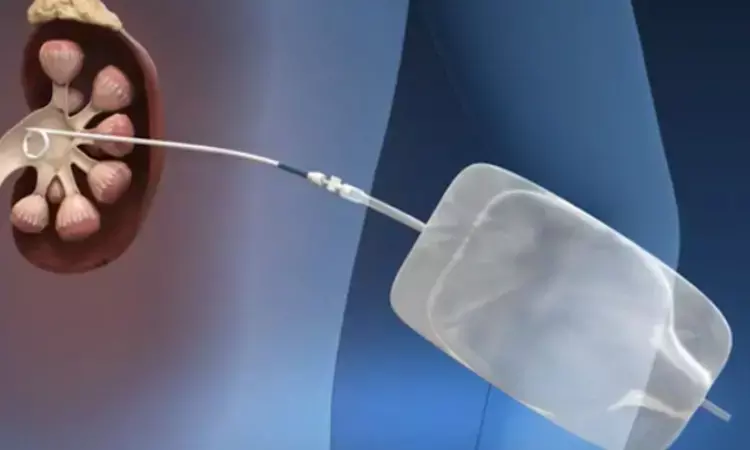- Home
- Medical news & Guidelines
- Anesthesiology
- Cardiology and CTVS
- Critical Care
- Dentistry
- Dermatology
- Diabetes and Endocrinology
- ENT
- Gastroenterology
- Medicine
- Nephrology
- Neurology
- Obstretics-Gynaecology
- Oncology
- Ophthalmology
- Orthopaedics
- Pediatrics-Neonatology
- Psychiatry
- Pulmonology
- Radiology
- Surgery
- Urology
- Laboratory Medicine
- Diet
- Nursing
- Paramedical
- Physiotherapy
- Health news
- Fact Check
- Bone Health Fact Check
- Brain Health Fact Check
- Cancer Related Fact Check
- Child Care Fact Check
- Dental and oral health fact check
- Diabetes and metabolic health fact check
- Diet and Nutrition Fact Check
- Eye and ENT Care Fact Check
- Fitness fact check
- Gut health fact check
- Heart health fact check
- Kidney health fact check
- Medical education fact check
- Men's health fact check
- Respiratory fact check
- Skin and hair care fact check
- Vaccine and Immunization fact check
- Women's health fact check
- AYUSH
- State News
- Andaman and Nicobar Islands
- Andhra Pradesh
- Arunachal Pradesh
- Assam
- Bihar
- Chandigarh
- Chattisgarh
- Dadra and Nagar Haveli
- Daman and Diu
- Delhi
- Goa
- Gujarat
- Haryana
- Himachal Pradesh
- Jammu & Kashmir
- Jharkhand
- Karnataka
- Kerala
- Ladakh
- Lakshadweep
- Madhya Pradesh
- Maharashtra
- Manipur
- Meghalaya
- Mizoram
- Nagaland
- Odisha
- Puducherry
- Punjab
- Rajasthan
- Sikkim
- Tamil Nadu
- Telangana
- Tripura
- Uttar Pradesh
- Uttrakhand
- West Bengal
- Medical Education
- Industry
Prolonged antibiotic courses have no benefit after PCNL for infectious stones

U.S.A.: According to a report published in the International Journal of Urology, neither two weeks nor twelve weeks of postoperative oral antibiotics are preferable to prevent stones and recurrent positive urine cultures for individuals who have had stones removed by percutaneous nephrolithotomy.
PCNL (percutaneous nephrolithotomy or stone extraction) is a minimally invasive approach of treating kidney and ureteral stones that are too big (often greater than 2 centimeters), multiple, or too dense to be managed by extracorporeal shock wave lithotripsy (ESWL) or ureteroscopy.
"Complete surgical stone removal for struvite kidney stones is necessary for treatment, along with antibiotic therapy to get rid of UTIs and preventative steps to lessen stone recurrence. Unknown is the ideal time frame for receiving antibiotics," the authors stated.
The purpose of this research was to compare the results for stone recurrence and positive urine cultures after 2- or 12-weeks of antibiotic treatment following percutaneous nephrolithotomy (PNL) for infection stones.
A multi-center, prospective randomized trial evaluating individuals with the clinical diagnosis of infection stones was conducted to achieve this objective. Patients were included if remaining fragments were less than 4 millimeters on computed tomography imaging following PNL and were randomly assigned to receive 2- or 12-weeks of postoperative oral antibiotics (nitrofurantoin or culture-specific antibiotic). At 3, 6, and 12 months after the surgery, imaging and urine tests were conducted. Following PNL, 38 patients were enrolled and randomly assigned to receive antibiotic therapy for either 2 weeks (n = 20) or 12 weeks (n = 18). Due to remaining pieces larger than 4 mm, 11 patients were disqualified, and 3 patients were lost to follow-up. The stone-free rate (SFR) at 6 months after PNL was the main result.
Conclusive points:
- At 3-, 6-, and 12-month follow-up, the SFRs between the 2- and 12-week groups were 72.7% versus 80.0%, 70.0% versus 57.1%, and 80.0% versus 57.1% (p = ns), respectively.
- Positive urine cultures at 3-, 6-, and 12-month follow-ups were 50.0% versus 37.5%, 50.0% versus 83.3%, and 37.5% versus 100%, respectively (p = ns).
The authors concluded that this study demonstrates that prolonged post-PCNL antibiotic courses do not offer greater protection in individuals being treated for infectious stones.
They emphasized that larger investigations are required to ascertain whether there are any clinically significant differences between these treatment techniques on a smaller scale.
REFERENCE
Chew, B.H., Reicherz, A., Krambeck, A.E., Miller, N.L., Hsi, R.S., Scotland, K.B., Miller, D., Paterson, R.F., Wong, V.K.F., Semins, M.J. and Lange, D. (2022), Prospective randomized trial of 2 versus 12-weeks of postoperative antibiotics after percutaneous nephrolithotomy in complex patients with infection-related kidney stones. Int. J. Urol..https://doi.org/10.1111/iju.15045
Dr Kamal Kant Kohli-MBBS, DTCD- a chest specialist with more than 30 years of practice and a flair for writing clinical articles, Dr Kamal Kant Kohli joined Medical Dialogues as a Chief Editor of Medical News. Besides writing articles, as an editor, he proofreads and verifies all the medical content published on Medical Dialogues including those coming from journals, studies,medical conferences,guidelines etc. Email: drkohli@medicaldialogues.in. Contact no. 011-43720751


